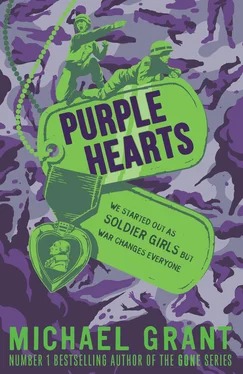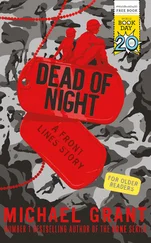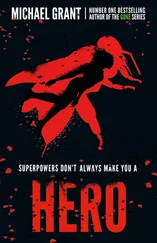The truck lurches off, rattling through the hectic camp, weaving through disorganized gaggles of soldiers and daredevil jeeps before heading out into the English countryside.
“Hey,” the redhead says.
“Me?”
“What are you, some kind of Injun?”
Lupé blinks. “No.”
“What are you then?”
“My folks come from Mexico. I come from Utah.”
“Utah, huh? Well, that beats all,” he says and shakes his head. Then he leans forward and extends his hand. “Hank Hobart, from St. Paul, Minnesota. Pleased to meet you.”
She’s been expecting hostility—there are a lot of Texans in the army, and few of them are ready to be civil to Mexicans. So she is non-plussed by his open expression and the outstretched hand. She takes it and feels a softness she’s never felt before in any hand, male or female.
“What do you do, Loopy?”
“Guadalupé,” she corrects. Then, “Or Lupé.”
“Loopy. That’s what I said, isn’t it?” He seems sincere, as though he hears no difference between his pronunciation and hers, which is more loo- pay than his loo-pee.
“Okay, Hank. I live on a cattle ranch.”
His blue eyes go wide and his pale eyebrows rise to comic heights. “You’re a cowgirl?”
“I guess so,” she says, feeling uncomfortable since that title is generally earned by many long years of work. Where she comes from “cowboy” means a whole lot more than major or captain.
“Guess what I do?” Hank asks. He’s tall, lanky, and so pale he’s practically translucent, and he owns an almost comically large nose that belongs on a statue of some noble Roman.
Lupé shakes her head. “No idea.”
“I play trombone in an orchestra.” He mimes moving a trombone slide.
This is so far from anything Lupé might have guessed that for a moment she can only frown and stare.
“You like jazz?” Hobart asks.
Lupé shrugs. “Like Tommy Dorsey?” It’s a lucky guess. There is no radio on the ranch, and what she knows of music is restricted to cowboy tunes and church hymns. But some of her school friends have radios, and she’s heard a few of the big names.
He nods. “Best trombone player around, I guess. Man, if I ever got that good . . . If ever ‘I’m Getting Sentimental Over You’ comes on the radio, sit down and open your ears and, man, that is one cool T-bone.” He has a look on his face that Lupé associates with religious ecstasy. Then he snaps back to reality. “So, where you figure we’re going?”
Lupé shrugs. This is more conversation than she’s had in a long time.
“Reckon we’re going to France,” Hank says. He looks concerned by the idea.
Lupé nods. “Reckon so.”
“Hell, yes, we’re going to France,” another male GI, a big slab of beef with an incongruous baby face, sandy hair and tiny blue eyes interjects. “We’re going to finish off the Krauts. They won’t know what’s hit ’em.” He bounces his legs a bit, either nervousness or anticipation.
Neither Hank nor Lupé is excited at this prospect and conversation dies out. They ride for an hour on roads choked with trucks and jeeps, ammo wagons and half-tracks, 155 Long Tom artillery pieces towed behind trucks, and even Sherman tanks. All of it, everything, is heading southeast.
At last the truck pulls into a new camp with well-ordered tents in endless rows. It looks remarkably like the last camp, and the one before that. The army, Lupé notes, owns a lot of tents.
“Last stop! Everyone off,” the driver yells.
They are met by a woman corporal who appears to be in a permanent state of irritation, rather like Sergeant Bonemaker. The corporal snatches paperwork, glances, and says, “All right, you three are going to Fifth Platoon. Report to Sergeant Sticklin.” In response to their blank, sheepish stares the corporal points and says, “Go that way till you come to the company road, turn right. You know your rights from your lefts, don’t you? Go right till you see a tent with a sign that says Fifth Platoon. Got it? Good. Now get lost.”
The three detailed to Fifth Platoon are Lupé, Hank and the eager fellow with the baby face who is named Rudy J. Chester. He makes a point of the “J.” He’s from Main Line, Philadelphia, and he says that as if it’s supposed to mean something special.
They find the company road, and after some questioning of busy noncoms they find the right tent. Sitting in a camp chair outside the tent are a male staff sergeant with a prominent widow’s peak, pale skin and intelligent eyes, and a woman buck sergeant with her mud-caked boots up on an empty C-ration crate and a tin canteen cup of steaming coffee in her hand.
“Here they are,” the staff sergeant says, at once weary and amused.
“Those are mine?” the woman buck sergeant asks. There is no attempt to disguise a critical, dubious look. “These are what I get in exchange for Cat Preeling?”
“Look at it this way, it’s three for one.”
“Except Cat can handle a BAR and won’t wet herself the first time she hears an 88.” The woman sergeant stands up and now Lupé sees that she has a long, curved knife strapped to her thigh—definitely not army issue.
“Line up,” the woman sergeant says. “No, not at attention, do I look like an officer? Is this a parade ground? I’m Sergeant Richlin. You can call me Sarge or you can call me Sergeant Richlin.”
Lupé looks closely and sees that amazingly the sergeant is quite young, probably no older than she is herself. Sergeant Richlin is a bit taller than Lupé, paled by weeks living with British weather, dark hair chopped man-short, blue eyes alert and probing.
“How about I call you sweetheart?”
This from the big boy from Philadelphia, Rudy J. Chester. He’s grinning, and for a moment Lupé is convinced that Sergeant Richlin will let it go. Then she sees the way Sticklin draws a sharp breath, starts to grin, looks down to hide it, shakes his head slowly side-to-side and in a loud stage whisper says, “The replacements are here.”
There’s the sound of cots being overturned and a rush of feet. A pretty blonde corporal bursts through the tent flap, blinking at the gray light as if she’s just woken up, glances around and says, “Uh oh.” And then, “Geer! Beebee! Get out here. I believe one of the replacements just back-talked Richlin.”
There’s a second flurry of movement and a young man with shrewd eyes, and a big galoot with an impressive forehead come piling out, faces alight with anticipation.
“What’s your name?” Sergeant Richlin asks.
“Rudy J. Chester. Sweetheart.” He grins left, grins right, sees faces that are either appalled or giddy with expectation, and then slowly, slowly seems to guess that maybe, just maybe, he’s said the wrong thing.
Rio Richlin steps up close to him, her face inches from his. He is at least four inches taller and outweighs her by better than fifty pounds. Which is why it’s so surprising that in less time than it takes to blink twice he is on the ground, face down, with his right wrist in Richlin’s grip, his arm stretched backward and twisted, and Richlin’s weight on her knee pressed against his back-bent elbow.
“Oh, come on, Richlin!” the big galoot says. “Should of used the knife!”
The pretty blonde shakes her head in mock disgust. “She’s gone soft, Geer. It’s all this high living.”
Richlin lets Rudy J. Chester writhe and struggle for a few seconds before explaining, “The average human elbow can be broken with just fourteen pounds of pressure, Private Sweetheart. How many pounds of pressure would you guess I can apply against your elbow?”
Chester struggles a bit more before finally saying, “More than fourteen pounds, I guess.”
“More than fourteen pounds I guess, Sergeant Richlin .” She gives his arm a twist that threatens to pop his shoulder out of its socket.
Читать дальше












